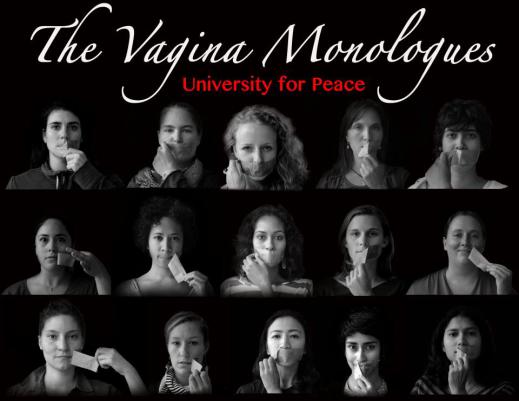
When Eve Ensler first performed “The Vagina Monologues” in New York City in 1996, the slogan was, “Spread the Word.” Eighteen years later, the word is officially spread: The play has been performed innumerable times around the world, in multiple languages and by actors as diverse as the human genome.
On March 8, the University for Peace in Ciudad Colón presents its annual production of “The Vagina Monologues.” The show stars 17 performers, most of whom are graduate students and are new to acting. The cast hails from such diverse nations as South Korea, India, South Africa and the United Kingdom. While most of the 14 monologues will be performed in the original English, one will be spoken in Spanish.
“We’ve done several productions in the past few years,” said Briana Cavion, a University for Peace student and organizer of the event. “But this is the first time it’s been done off-campus.”
“The Vagina Monologues” will take place in the Teatro de la Palestra in the middle of Ciudad Colón. Ninety percent of ticket sales will benefit CEFEMA, a local women’s organization, while the remaining 10 percent will go to One Billion Rising, Ensler’s antiviolence nonprofit. The show takes place on International Women’s Day, a holiday proclaimed by the United Nations in 1977.
Simple to produce and spoken directly to the audience, “The Vagina Monologues” has become a pillar of women’s empowerment. Ensler originally interviewed more than 200 women for source material, and many of the monologues condense multiple stories into one. She asked her subjects personal questions about their most intimate organs and based her writing on their answers. Some of the anecdotes are upbeat and funny, while others are deeply disturbing, such as the recollections of a woman who survived a Serbian rape camp during the Yugoslav Civil War.
The script is highly elastic and was designed to be performed almost anywhere. While Ensler insists that some monologues should remain intact, directors routinely pick and choose which vignettes they wish to include, and they arrange the order like a theatrical playlist. (The University for Peace production even includes three original monologues written by the cast). The show is frequently performed in universities, where inexperienced actors are encouraged to cut their teeth.
While auditions were held, every hopeful was accepted for at least one role. “We made everybody read for the parts of the monologues that they wanted,” said Heather McCuen, the production’s director. “But I don’t think there was anyone who expressed an interest who was left out.”
For Cavion, the project is less about art and more about community. “I love theater, but what I’m really interested in is the transformation and the experience that the artists and the performers can potentially have,” said Cavion. “I always notice a conversation. For people who haven’t had space to have conversations about [women’s sexuality], it always takes them to a new [place in] their comfort zone. I find that to be true for men and for women, for the actors, for the directors, for everyone involved.”
Cavion and McCuen view Costa Rica as a fairly conservative country, where female-centric issues like contraceptives, abortion, birthing options, and prostitution are not discussed as freely or broadly as in some other countries. By bringing their production into the community, Cavion and McCuen hope to enhance that dialogue. The production comes at the heels of V-Day, a global movement to end violence against women. Cavion and her colleagues organized a flash mob to raise awareness about One Billion Rising.
As in previous years, the one-night performance will be videotaped for their archives. The show’s veterans occasionally return to these videos to review and remember how past versions were performed. But Cavion is reluctant.
“I don’t like to look at it afterward,” she says. “I’m not a big fan of watching myself.”
“The Vagina Monologues” will take place March 8 at the Teatro de la Palestra, Casa de Cultura, Ciudad Colón. 7 p.m. $4-6. Info: EventBrite website.





